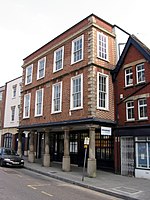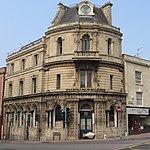Pali Text Society
The Pāli Text Society is a text publication society founded in 1881 by Thomas William Rhys Davids "to foster and promote the study of Pāli texts." Pāli is the language in which the texts of the Theravada school of Buddhism are preserved. The Pāli texts are the oldest collection of Buddhist scriptures preserved in the language in which they were written down. The society first compiled, edited, and published Latin script versions of a large corpus of Pāli literature, including the Pāli Canon, as well as commentarial, exegetical texts, and histories. It publishes translations of many Pāli texts. It also publishes ancillary works including dictionaries, concordances, books for students of Pāli and the Journal of the Pali Text Society.
Excerpt from the Wikipedia article Pali Text Society (License: CC BY-SA 3.0, Authors).Pali Text Society
Old Market Street, Bristol St Philip's
Geographical coordinates (GPS) Address Nearby Places Show on map
Geographical coordinates (GPS)
| Latitude | Longitude |
|---|---|
| N 51.4556631 ° | E -2.5823537644184 ° |
Address
Old Market Studios
Old Market Street 68
BS2 0EH Bristol, St Philip's
England, United Kingdom
Open on Google Maps










